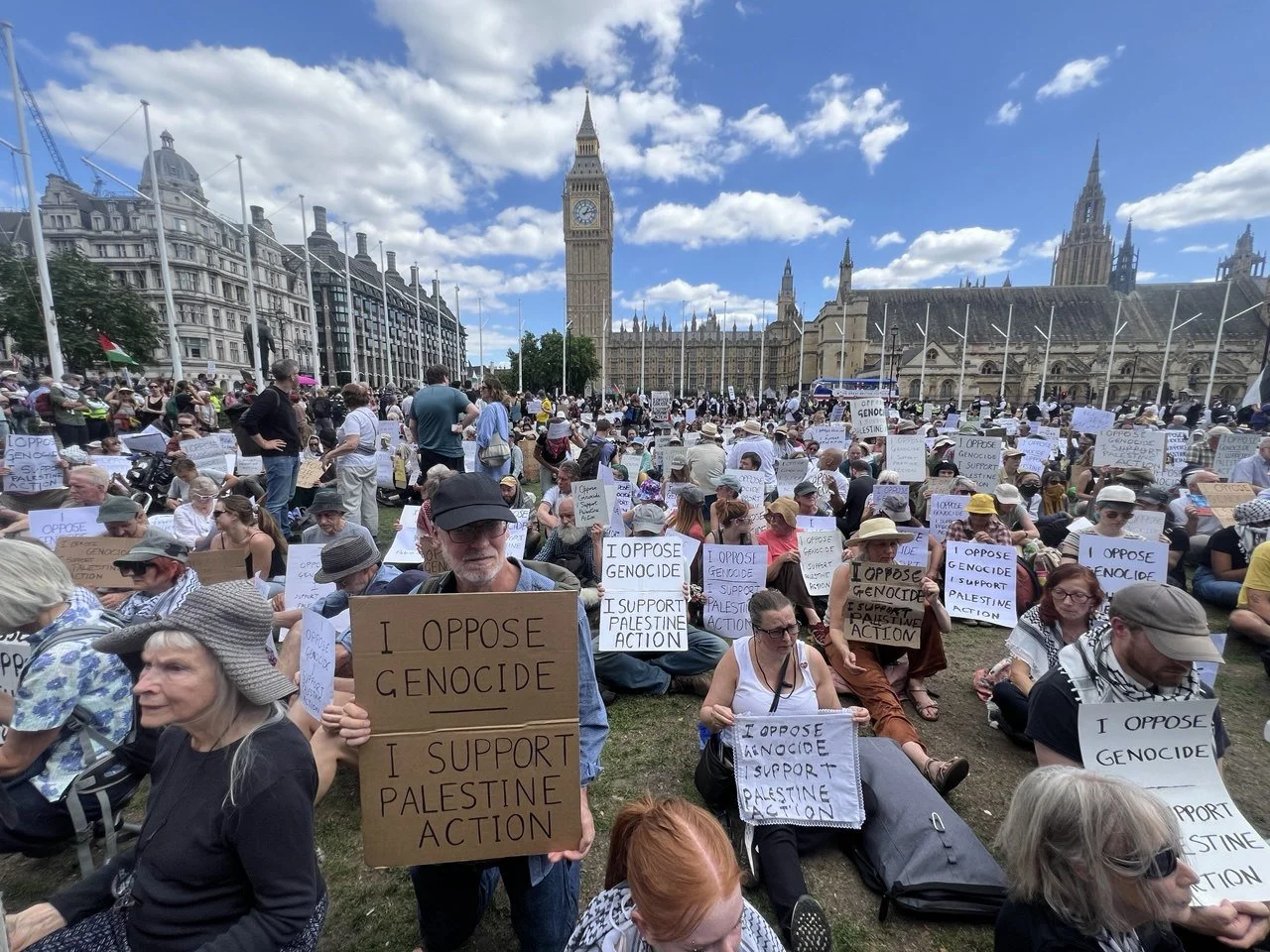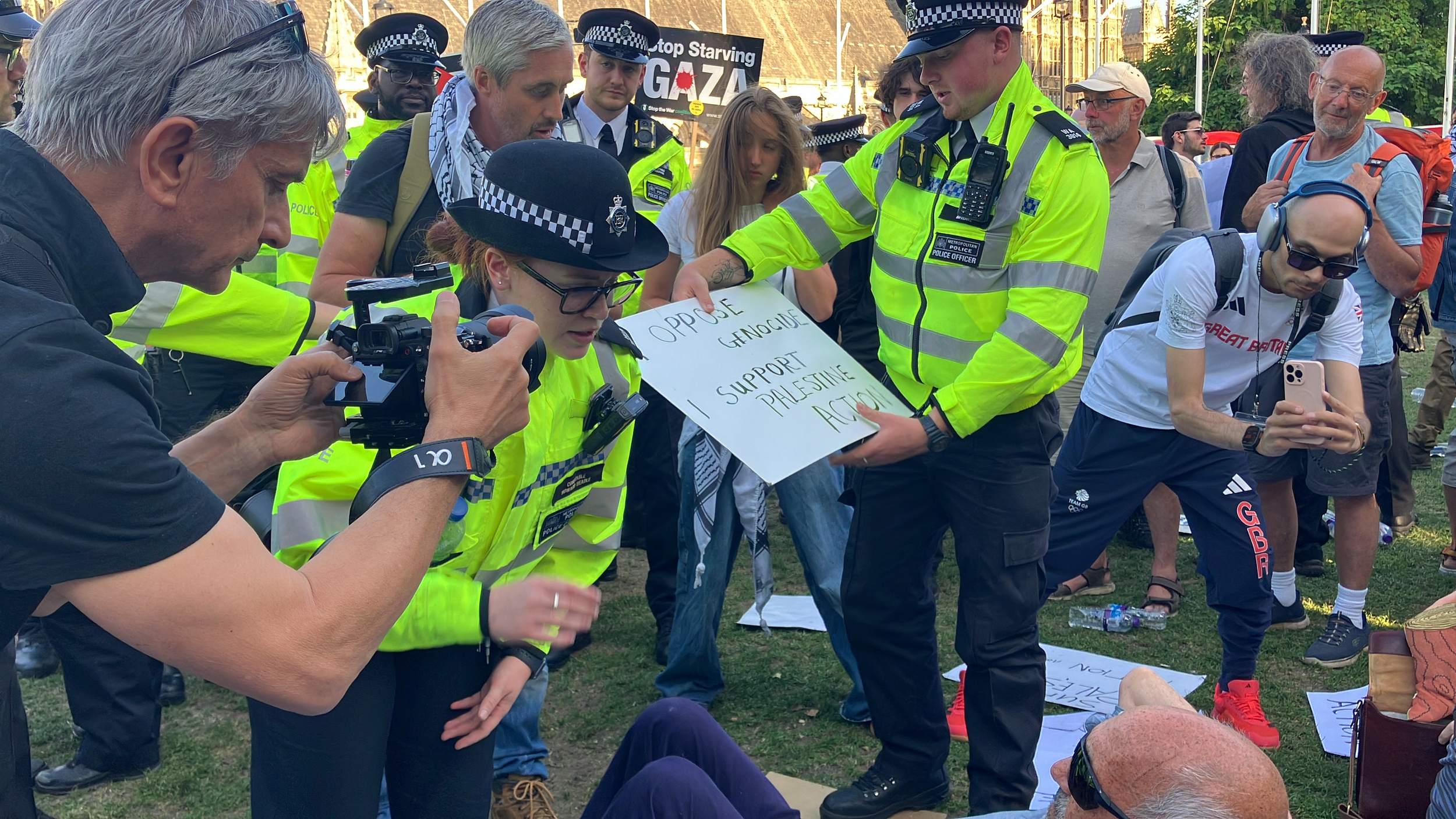Cambridge Chancellor Candidate Arrested at Palestine Action Protest: Tony Booth Speaks
On August 9th, in an action organised by Defend Our Juries, around a thousand people peacefully gathered in Parliament Square to protest the UK Government’s decision to proscribe ‘Palestine Action’ as a terrorist group.
The Police report making 522 arrests, the vast majority aged between 60 and 69. Placards reading ‘I Oppose Genocide, I Support Palestine Action’ were enough to bring demonstrators under terrorism laws designed for the likes of Isis and al‑Qaida. Those apprehended included, of course, that classic terror profile: a Catholic priest, a former army colonel, a BBC screen writer, and even an ex-candidate for the position of Chancellor at Cambridge University. This man, Professor Tony Booth, sat down with TCS to talk about his experience of arrest, the right to protest, and his predictions for the political situation at hand.
The Events of the Day: Police Provide Refreshments Before Mass Arrests
‘Our Cambridge group arrived at 12:15’. He describes the day as particularly strange, marked by the law’s severity compared to the police’s relaxed demeanour: ‘Surely, they wouldn’t allow a mass of ‘terrorist supporters’ to sit down in Parliament Square?’. Booth even brought a chair with him and was surprised when the police allowed him to proceed, since amid an atmosphere charged with suspicion, he ‘could have done some serious damage with its metal frame and legs!’
Unexpectedly unimpeded, ‘by 1PM there were about nine hundred of us, each having written on our placards in the few previous minutes.’ He says the group was surrounded by both officers and supporters. After the initial ‘trickle of arrests’, ‘Each was greeted noisily with applause and whoops and also angry cries of “Shame!” or “Genocide supporter!” aimed at the police.’
Unlike usual police responses to suspected terror activities, typified by an incident last month, where a group of armed officers dealt with a lone man in Belfast - in this instance, the ‘police felt they had to distribute bottles of water’ to a group of near one thousand, given the intensity of the sun, and the age of the crowd.
Later in the day, ‘the police reversed their policy of minimum arrest,’ and ‘the group got smaller and smaller,’ as the officers worked through ‘around 500 arrests in the last five hours.’
Tony was taken at 6:15 PM by ‘a half dozen officers’. He described how each arrest took ‘four to carry you and someone to carry your bags’ given that ‘most of us decided we weren't going to make it easy and we would be carried away’. He highlights how most refused to simply stand up to show how ‘this was a ludicrous waste of resources and police time.’
“…a ludicrous waste of resources and police time.”
Ordinary Chats Under Extraordinary Powers
The disconnect between the law and its enforcement became even clearer still during the experience of arrest. TCS spoke to a student who was also arrested during this protest. Emily* describes how ‘the woman who arrested me was 25 years old and she'd been on the job since 8AM.’ She explains how sitting next to an officer for hours meant that there was truly nothing else to do but have a chat. The officer confessed to her that she’d ‘never done anything like this before,’ that she’d ‘never seen this police response like this.’
Booth joked with his arresting officer, saying he imagined he’s ‘had much harder days than this.’ The officer, ‘young and 21 years old’ replied: ‘oh yes! I know that none of you are troublemakers.’ For Booth, it registered as a surprise that ‘whatever we were, 520 people, arrested under the terrorism act,’ were not thought of as ‘troublemakers’ by the police themselves.
‘oh yes! I know that none of you are troublemakers.’
At the end of the day, Emily recalls a peculiar scene. There was a ‘weird period where every single police officer,’ in line and handing all ‘suspect’ material to the plain clothes counter terror lead ‘was just holding a poster that said, “I Oppose Genocide, I support Palestine Action”.’ She joked with her arresting officer, "Oh, you should really take a look down there, because there's lots of people holding signs in support of “Palestine Action”.’ Unfortunately ‘she didn’t find it funny.’ instead responding dryly, ‘you're actually free to leave now so you can go.’
The day’s ludicrum came to a peak when, while waiting in the queue to be processed, Emily witnessed an 87 year old woman struggling to stand who ‘kept having to shuffle a tiny little chair forward’ as she progressed in the line. Emily confesses she was surprised not only ‘by the sheer quantity of incredibly old people there,’ but also by her arresting officer's behaviour. ‘Every time the queue would move,’ her and the officer ‘would take turns to pick up the bag and move it. If I ever went to pick up the sign she would say: “No, You can't touch that!” - and pick it up herself because, as we went along the queue, I wasn't allowed to hold the sign.’
The Right to Protest:
The UK’s attacks on the right to protest have been building for years, often driven by politicians whose stances are mired in contradiction. The Home Secretary, Yvette Cooper, proscribed Palestine Action this June, yet was photographed in July celebrating the suffragettes - a movement infamous for bombings, arson, and attacks on cultural institutions. Giving the impression that direct action is only celebrated once safely in the past, unable to unsettle the present.
Booth predicts that the law ‘will probably be overturned in November. ‘They'll try and resist and they'll put up a legal team, but I think it'll probably be overturned in the High Court.’
He points out how the authorities can already ‘prosecute under the law,’ and that ‘you don't need to proscribe an organisation to punish it for throwing paint.’ In his words ‘a terrorist organisation is an organisation set up to harm a civilian population; this is a direct action organisation set up to prevent harm against civilians.’
“A terrorist organisation is an organisation set up to harm a civilian population; this is a direct action organisation set up to prevent harm against civilians.”
Emily explains that the group's historical actions ‘specifically target anyone who works with Elbit, an Israeli weapons manufacturer.’ This includes ‘Elbit landlords, insurers, the people who make various parts for the factories. It’s a singular focussed campaign - non violent - not trying to inspire terror and inflict violence on civilians.’
She further highlights how ‘most British people are in favour of a weapons embargo,’ yet ‘the government have been flying spy planes across across Gaza and reporting back to the Israeli government, so the Israeli government can issue drone strikes on certain areas.’ She concludes: ‘they're so involved in the protection of the Israeli state that they would arrest 520 pensioners just to maintain the violence in Gaza; that is really something quite enormous.’
“They would arrest 520 pensioners just to maintain the violence in Gaza; that is really something quite enormous.”
For Booth, this is ‘probably the most ludicrous piece of government legislation I've seen in my lifetime.’ When asked if he wanted to remain anonymous in this article, he declined, explaining, ‘generally speaking, my policy is to take responsibility for my actions and to do things I’m happy to put my name to.’ As an older person, he believes, ‘I don't face much risk of being fined for writing on a placard.’ He sees ‘the younger protesters’ as ‘more courageous than the older ones, because it’s more of a worry, what potentially having a conviction under the Terrorism Act could mean for a young person's life. I don’t face much harm being fined for carrying a placard. There’s a lot of talk about possible 14-year prison terms, but in reality, if they do go to court. It'll be a few fines - that’s what I think.’
‘If the charges aren't dropped, it will escalate suppression to an unimaginable level.’ Ultimately, Booth is driven by the belief that ‘it will take as many of us as possible to stand up and overturn this law and show up this government’s ludicrous attempts to outlaw protest by any and all means.”
A Precedent That Threatens Us All
Protest rights have not just been curtailed at the national level, but also within Cambridge itself, where the university secured a High Court injunction to restrict demonstrations on key parts of its campus. This legal move, aimed at pro-Palestine activism, has sharply limited where and how students and staff can protest - reflecting the broader, escalating efforts to suppress dissent across the UK.
Tony Booth ran as an ‘ethical candidate’ in the most recent election to the university chancellorship. In his view, ‘the university should be an ethical institution. By the university and the colleges continuing to maintain investments in the arms industry during an ongoing genocide - this reflects an insult to its staff and students.’
He explains how ‘when the university acts against protest, it's because it's caught up, it’s a neoliberal organisation. It’s putting business interests first and, ultimately, protests are bad for business.’
He exposes a particular contradiction: ‘most people would think that the business of a university is dialogue, yet here we’ve found that the university has been incapable of coming to a reasonable conclusion with protesting students, instead feeling it has to use an injunction to prevent protest.’
For Emily, the stakes couldn’t be higher. For her, national and university-wide repression represents a fundamental attack on the right to protest: ‘I would like everyone to know that if this law is allowed to pass, it will set a precedent, and they will pass further laws. Anything that incumbers business will no longer be a valid form of protest… and then you’re left to think - well what can you actually do then?’
‘For the workers rights movement, for pro-palestine organisation, and any opposition against future wars, future genocides - there will be no material way to oppose any of it.’
* names have been changed to protect identity when requested.



